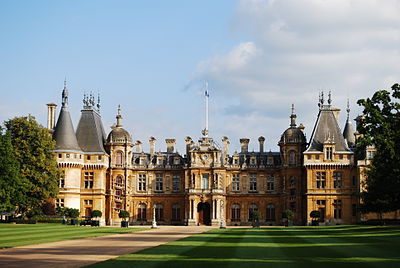Rothschild properties in the home counties

Of all the landowners in the Home counties, particularly the Buckinghamshire area, none has had more impact on the landscape than the Rothschild family.[citation needed] The country houses that were purchased or built in or around Buckinghamshire included:
- Ascott House, Wing
- Aston Clinton House, Aston Clinton
- Champneys, Wigginton
- Eythrope, Waddesdon
- Exbury estate (in Hampshire)
- Gunnersbury Park (in Middlesex)
- Halton House, Halton
- Mentmore Towers, Mentmore
- Tring Park Mansion, Tring
- Waddesdon Manor, Waddesdon
When Nathan Mayer Rothschild first arrived in London in the early nineteenth century his priority was to establish his business and to acquire influence. By the time of his death in 1836 he was able to pass a fast-growing banking business on to his eldest son Lionel Rothschild (1808–1879). Gunnersbury Park in Middlesex was the first Rothschild country house to be purchased (in 1835), marking the start of a move north and westwards to Hertfordshire and the Vale of Aylesbury.
The Rothschilds began to acquire large estates in Buckinghamshire in the 1840s, when an estate was purchased near Mentmore for hunting, and a stud farm and kennels were established. Lionel Rothschild's brother, Baron Mayer de Rothschild, became the first Rothschild to build a house in Buckinghamshire when he commissioned Joseph Paxton to design Mentmore Towers in 1850. Buckinghamshire had recently been blighted by a livestock famine that had almost destroyed the rural communities and so picturesque estates that were in proximity to London were going cheap, and the agricultural depression saw many landed estates come onto the market. By 1900, different branches and generations of the family owned thousands of acres, so the Vale of Aylesbury almost became a Rothschild enclave.[citation needed]
Nathan Mayer Rothschild had rented Tring Park in Tring, Hertfordshire in the 1830s. It was purchased with 4,000 acres (16 km²) by Lionel Rothschild in May 1872 as his principal country residence. The family seat was established at Waddesdon Manor, near to the market town of Aylesbury, and the Rothschilds also purchased the historic King's Head Inn in Aylesbury. The King's Head was donated to the National Trust in 1925.
Eythrope is the country home of the current Lord Rothschild. Waddesdon Manor and Ascott House were donated to the National Trust, though in the latter case a branch of the family retained the right to live in part of the house. Halton is now an officers' mess, and Tring is a school of the performing arts. Mentmore has passed through various hands, and planning permission is in place for its conversion into a hotel[citation needed]. Aston Clinton was demolished in the 1950s.
Other Rothschild properties included Bentley Priory and Champneys (near Wigginton), both in Hertfordshire, and the family still owns an estate at Ashton Wold near Oundle in Northamptonshire, the family home of Dame Miriam Louisa Rothschild. Further afield, the Rothschild family owns the Exbury estate in Hampshire, world famous for the Rothschild collection of rhododendrons, azaleas and camellias.[citation needed]
References
- Ferguson, Niall (1998). The World's Banker: the History of the House of Rothschild. London: Weidenfeld and Nicolson. ISBN 0-297-81539-3.
